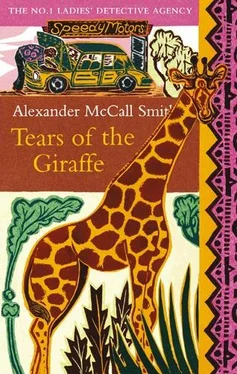She stopped. She had not intended it, and yet it was too late now. She did not consider Mr J.L.B. Matekoni to be dull; he was reliable, and he was a mechanic, and he would be an utterly satisfactory husband. That is what she had meant; she did not mean to suggest that he was actually dull.
Mma Ramotswe stared at her. "To a what?" she said. "I am very lucky to be engaged to a what?"
Mma Makutsi looked down at her shoes. She felt hot and confused. The shoes, her best pair, the pair with the three glittering buttons stitched across the top, stared back at her, as shoes always do.
Then Mma Ramotswe laughed. "Don't worry," she said. "I know what you mean, Mma Makutsi. Mr J.L.B. Matekoni is maybe not the most fashionable man in town, but he is one of the best men there is. You could trust him with anything. He would never let you down. And I know he would never have any secrets from me. That is very important."
Grateful for her employer's understanding, Mma Makutsi was quick to agree.
'That is by far the best sort of man," she said. "If I am ever lucky enough to find a man like that, I hope he asks me to marry him."
She glanced down at her shoes again, and they met her stare. Shoes are realists, she thought, and they seemed to be saying: No chance. Sorry, but no chance.
"Well," said Mma Ramotswe. "Let's leave the subject of men in general and get back to Mr Badule. What do you think? Mr Andersen's book says that you must have a working supposition. You must set out to prove or disprove something. We have agreed that Mma Badule sounds bored, but do you think that there is more to it than that?"
Mma Makutsi frowned. "I think that there is something going on. She is getting money from somewhere, which means she is getting it from a man. She is paying the school fees herself with the money she has saved up."
Mma Ramotswe agreed. "So all you have to do is to follow her one day and see where she goes. She should lead you straight to this other man. Then you see how long she stays there, and you speak to the housemaid. Give her one hundred pula, and she will tell you the full story. Maids like to speak about the things that go on in their employers' houses. The employers often think that maids cannot hear, or see, even. They ignore them. And then, one day, they realise that the maid has been hearing and seeing all their secrets and is bursting to talk to the first person who asks her. That maid will tell you everything. You just see. Then you tell Mr Badule."
"That is the bit that I will not like," said Mma Makutsi. "All the rest I don't mind, but telling this poor man about this bad wife of his will not be easy."
Mma Ramotswe was reassuring. "Don't worry. Almost every time we detectives have to tell something like that to a client, the client already knows. We just provide the proof they are looking for. They know everything. We never tell them anything new."
"Even so," said Mma Makutsi. "Poor man. Poor man."
"Maybe," Mma Ramotswe added. "But remember, that for every cheating wife in Botswana, there are five hundred and fifty cheating husbands."
Mma Makutsi whistled. "That is an amazing figure," she said. "Where did you read that?"
"Nowhere," chuckled Mma Ramotswe. "I made it up. But that doesn't stop it from being true."
IT WAS a wonderful moment for Mma Makutsi when she set forth on her first case. She did not have a driving licence, and so she had to ask her uncle, who used to drive a Government truck and who was now retired, to drive her on the assignment in the old Austin which he hired out, together with his services as driver, for weddings and funerals. The uncle was thrilled to be included on such a mission, and donned a pair of darkened glasses for the occasion.
They drove out early to the house beside the butchery, where Mr Badule and his wife lived. It was a slightly down-at-heel bungalow, surrounded by pawpaw trees, and with a silver-painted tin roof that needed attention. The yard was virtually empty, apart from the pawpaws and a wilting row of cannas along the front of the house. At the rear of the house, backed
up against a wire fence that marked the end of the property, were the servant quarters and a lean-to garage.
It was hard to find a suitable place to wait, but eventually Mma Makutsi concluded that if they parked just round the corner, they would be half-concealed by the small take-out stall that sold roast mealies, strips of fly-blown dried meat and, for those who wanted a real treat, delicious pokes of mopani worms. There was no reason why a car should not park there; it would be a good place for lovers to meet, or for somebody to wait for the arrival of a rural relative off one of the rickety buses that careered in from the Francistown Road. The uncle was excited, and lit a cigarette. "I have seen many films like this," he said. "I never dreamed that I would be doing this work, right here in Gaborone."
"Being a private detective is not all glamorous work," said his niece. "We have to be patient. Much of our work is just sitting and waiting."
"I know," said the uncle. "I have seen that on films too. I have seen these detective people sit in their cars and eat sandwiches while they wait. Then somebody starts shooting."
Mma Makutsi raised an eyebrow. "There is no shooting in Botswana," she said. "We are a civilized country."
They lapsed into a companionable silence, watching people set about their morning business. At seven o'clock the door of the Badule house opened and a boy came out, dressed in the characteristic uniform of Thornhill School. He stood for a moment in front of the house, adjusting the strap of his school satchel, and then walked up the path that led to the front gate. Then he turned smartly to the left and strode down the road. "That is the son," said Mma Makutsi, lowering her voice, although nobody could possibly hear them. "He has a scholarship to Thornhill School. He is a bright boy, with very good handwriting." The uncle looked interested. "Should I write this down?" he asked. "I could keep a record of what happens."
Mma Makutsi was about to explain that this would not be necessary, but she changed her mind. It would give him something to do, and there was no harm in it. So the uncle wrote on a scrap of paper that he had extracted from his pocket: "Badule boy leaves house at 7 A.M. and proceeds to school on foot." He showed her his note, and she nodded. "You would make a very good detective, Uncle," she said, adding: "It is a pity you are too old."
Twenty minutes later, Mr Badule emerged from the house and walked over to the butchery. He unlocked the door and admitted his two assistants, who had been waiting for him under a tree. A few minutes later, one of the assistants, now wearing a heavily bloodstained apron, came out carrying a large stainless steel tray, which he washed under a standpipe at the side of the building. Then two customers arrived, one having walked up the street, another getting off a minibus which stopped just beyond the take-out stall.
"Customers enter shop," wrote the uncle. "Then leave, carrying parcels. Probably meat."
Again he showed the note to his niece, who nodded approvingly.
"Very good. Very useful. But it is the lady we are interested in," she said. "Soon it will be time for her to do something."
They waited a further four hours. Then, shortly before twelve, when the car had become stiflingly hot under the sun, and just at the point when Mma Makutsi was becoming irritated by her uncle's constant note-taking, they saw Mma Badule emerge from behind the house and walk over to the garage. There she got into the battered Mercedes-Benz and reversed out of the front drive. This was the signal for the uncle to start his car and, at a respectful distance, follow the Mercedes as it made its way into town.
Mma Badule drove fast, and it was difficult for the uncle to keep up with her in his old Austin, but they still had her in sight by the time that she drew into the driveway of a large house on Nyerere Drive. They drove past slowly, and caught a glimpse of her getting out of the car and striding towards the shady verandah. Then the luxuriant garden growth, so much richer than the miserable pawpaw trees at the butchery house, obscured their view.
Читать дальше









